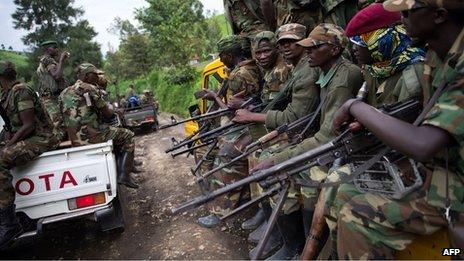Tony Blair defends Rwanda's role in DR Congo
- Published

Former UK Prime Minister, Tony Blair, has defended Rwanda over its part in the conflict in eastern Democratic Republic of Congo.
He told the BBC the causes of that conflict were complex and Kigali should not be singled out for blame.
He also said it was wrong to withhold aid to Rwanda, as many Western countries have done.
Rwanda denies a UN accusation that it has been backing the Congolese M23 rebel group.
About 800,000 people have been displaced in fighting since May 2012 when the rebels launched a rebellion against the DR Congo government.
Tony Blair: "Withdrawing aid is a way to punish the people of Rwanda without solving the issue of the conflict"
Last year, a report by the UN Security Council's Group of Experts said that M23 leaders "receive direct military orders" from Rwanda's chief of defence staff, Gen Charles Kayonga, "who in turn acts on instructions from the minister of defence", Gen James Kabarebe.
Mr Blair acts as a personal adviser to Mr Kagame - who came to power after the 1994 genocide - and one of his charities, the Africa Governance Initiative (AGI), employs people inside the Rwandan government.
"If you read, and I have read, both the UN report and the very detailed rebuttal of those claims by the Rwandan government, you've got to say there's a dispute over the facts," Mr Blair told the BBC's Focus on Africa TV programme.
He said there were a dozen different small militias in DR Congo, complicating the situation for the government.
"I'm not disputing the need to make sure that everybody abides by the right international principles here, I'm simply saying it isn't right to put all of this on Rwanda ," he said.
Rwanda had made good use of the aid money and there had been massive poverty reduction in the country, Mr Blair said.
Rwanda had "virtually eliminated measles in the country, now moving on to rubella".
"The way they've reduced malaria deaths by something like 60%. These are massive achievements done through aid.
"To withdraw the aid in those circumstances seems to me a way to punish the Rwandan people without necessarily helping the issue of the conflict."
Mr Kagame's critics accuse him of leading a repressive regime, which jails opponents and cracks down on the media.
Last October, opposition leader Victoire Ingabire was convicted of treason and sentenced to eight years in jail. She denied the charge.